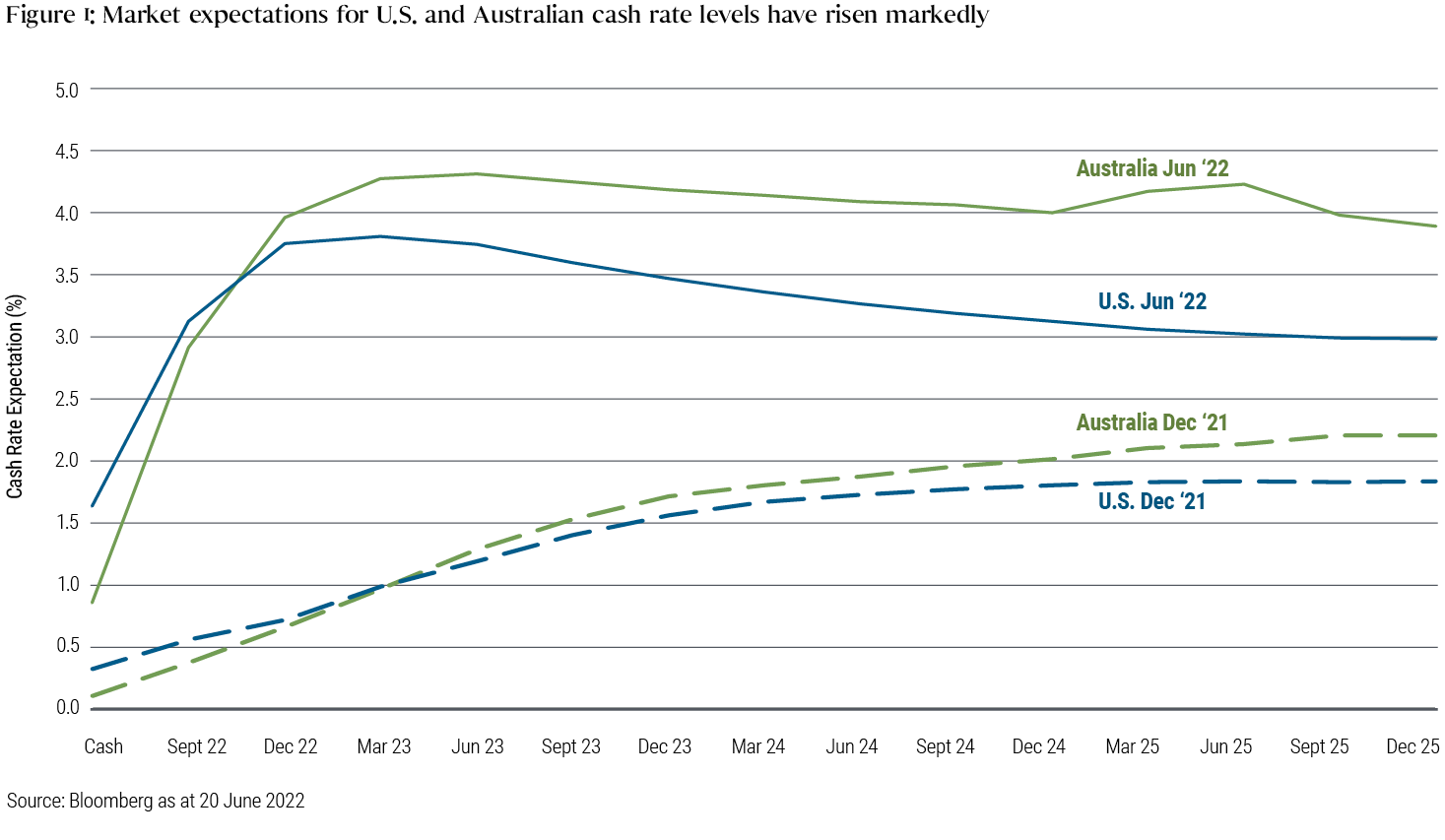What rising rates mean for bond yields and mortgages in Australia
Inflationary pressures have been stubbornly persistent in most economies this year given COVID-19 supply chain disruptions, labour shortages and energy price increases. Bond yields have risen as investors recalibrate inflation expectations and the destination of cash rates. With mortgage rates also starting to creep up, we assess what Australian investors should expect from the bond and mortgage markets over the coming year.
Central banks are tightening policy aggressively to combat inflation
Heading into 2022, markets and central banks were at odds over the pace and magnitude of rate hikes. The bond market has been expecting central banks to raise cash rates more aggressively than the banks themselves have been communicating. It is becoming apparent that the market was right. Over recent months, the U.S. Federal Reserve (Fed), the Reserve Bank of New Zealand and the Bank of Canada have commenced aggressive monetary policy tightening via asset sales and significant cash rate increases, including a 75 basis point increase by the Fed in June. In addition, in May and June, the Reserve Bank of Australia (RBA) began meaningful cash rate increases, raising the cash rate from a record low 0.1% to 0.85%.
Markets now expect the U.S. target interest rate to peak at around 3.75% in March 2023 from its current range of 1.50%–1.75% (see Figure 1). In Australia, markets expect the cash rate to rise to around 4.25% by June 2023. If these rate increases transpire, they would represent a significant step-up in a short time period.

Cash rate rises are already priced into bond yields
Bond markets are forward-looking in the sense that they reflect investor expectations for cash rates and inflation in the future. Fixed-rate bond investors focus on these factors because they have a material impact on investment outcomes.
Just as a dividend announcement made by a company is priced into its stock value before it is actually paid, expected cash rate hikes are priced into bond values before the cash rate increases happen. If the cash rate is expected to rise quickly, this can lead bond yields to rise and thus bond prices to fall. The reason prices tend to fall is because the income from existing fixed-rate bonds is relatively less attractive than newly issued higher yielding bonds.
Based on bond market pricing as of June 20, investors anticipate the average cash rate in Australia over the next three years to be just over 3.5%. At June 20, a three-year Australian government bond was yielding 3.7%. Therefore, if the RBA rate hikes follow the path expected in Figure 1, bond prices have already taken into account expected cash rate increases over the next 12-18 months.
Mortgage rate increases should limit rises in the cash rate beyond current expectations
Banks obtain their funding from three main sources: shareholder capital, retail deposits and wholesale debt markets. A rise in funding costs from wholesale markets has a knock-on effect on mortgage rates since banks aim to match funding for fixed-rate mortgages with mortgage terms to lock in a profit margin. Fixed-rate mortgages began increasing in late 2021 (before the cash rate hike) because bond yields started to rise and the RBA discontinued its Term Funding Facility (TFF), which had offered banks low cost funding fixed for three years at the cash rate.
In February 2020, roughly 14% of new home loans were fixed-rate loans. The pandemic changed this significantly, with almost half of all new loans written in June 2021 and a little more than half of first homebuyer loans being fixed-rate.(1) A big contributor to the change was the TFF, which allowed banks to offer three-year fixed-rate mortgages below 2%. The refinancing of those loans will start in late March 2023 when both fixed- and variable-rate mortgages could be at least 2% p.a. higher than existing fixed-rate mortgages.
Currently, many fixed-rate owner-occupier mortgages in Australia are being offered at around 4% per annum or higher. Variable-rate mortgages will increase with the cash rate as banks pass on the extra cost of funding. If market expectations are correct about where cash rates will be in 2023, a variable-rate home loan is likely to hit around 6% sometime next year.
The impending increases in mortgage rates will materially affect mortgage servicing costs for households and could weigh on house prices. Given the significant rise in household debt over the past decade, Australians are much more sensitive to increases in mortgage rates than in previous rising rate cycles. Unlike past decades, we estimate that a cash rate of around 4.25% (as is currently priced into markets) represents meaningfully restrictive policy settings for Australian households.
Australian bond yields have risen significantly over recent months with markets now expecting restrictive monetary policy settings
If market pricing for the cash rate were to be realised, it would have a significant impact on households’ ability to service their mortgages, particularly amid rising living costs caused by inflation. As a result, we think it will be difficult for the RBA to increase the cash rate beyond current market expectations, which should limit Australian bond yields from rising much further.
For more on what rate rises mean for Australian investors, read our recent Viewpoint: “Bracing for a Rise in Real Interest Rates in a Post COVID 19 World”.

3 topics
1 fund mentioned

